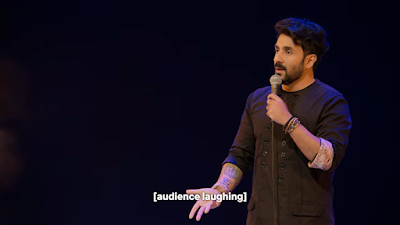I recently watched Vir Das’s comedy show “Landing” on Netflix. It was a real treat to discover such a sharp and funny comedian.
A good chunk of Das’s routine describes the outrage that was generated by a piece he performed called “Two Indias.” It was obvious that a lot of the audience knew about this. He tells a joke about the reaction on social media:
“They start a hashtag, they’re like, ‘Vir Das is a slave!’”
“Which would be offensive to me except my last name is Das.”
And the crowd in the theatre laughed.
I was not laughing. Not because I was outraged, but because I was confused. There was clearly something I was missing. But I was not alone and Das knew it:
“I’ll translate. Don’t worry, non-Indians. Don’t worry. I got you.”
He explained that his surname, Das, means “slave” in Hindi.
That he was performing in English to an audience where a lot of people understood Hindi – but some did not know Hindi – became part of the act. Later, he did a routine describing Mumbaiker trash talk.
That line drew a huge roar of laughs from the crowd, who clearly got the reference.
Netflix translated the phrase as “Come and dare to battle me or else, fuck off!” But what was funnier was that Das – again aware that there were a lot of Anglos in the crowd – translated it as part of his set, and did so differently.
“But in English, it literally translates into like...”
“‘Get on the field...’“Or shove something up your ass.’”
The routine goes on from there, but by now you’re probably wondering what this has to do with posters.
Posters are a relaxed format. You can have more fun with them that in other academic communication. So people will often try to make their presentations more appealing by putting a joke in the title.
But the risk is that the jokes exclude some viewers.
So much comedy refers to cultural touchstones that the comedian and the audience have in common. If you don’t have those shared references, the jokes don’t work.
What kicked this off was seeing poster that was partly titled, “The
enemy of my anemone.” That made me smile. But then I thought, “Do other
languages have a phrase like, ‘The enemy of my enemy is my friend’? Or
that that just an English thing?” I didn’t know.
At a small local conference, this might not be that big a problem. But at a big international conference, it’s more likely that there will be someone who doesn’t get the pun because it only works in English, or who aren’t familiar with an English expression or idiom. Or a book title or whatever else you might want to riff off of.
Vir Das took the time to bring the Anglos along with him, but you know how it feels when you get a joke after someone has explained it to you. Sure, the joke might still be funny, but it’s not as funny as when you “get it” yourself.
These are just examples of an old truism: comedy is hard. While I hate to say it because I love having fun with conference presentations, I have landed on the side of generally advising people not to use wordplay and jokes in their poster titles.
In the main body of the poster, there is more leeway for jokes. But the title is so critical and is the only thing seen by so many people, the need for clarity and concision is extraordinarily high.










No comments:
Post a Comment
Comments are moderated. Real names and pseudonyms are welcome. Anonymous comments are not and will be removed.